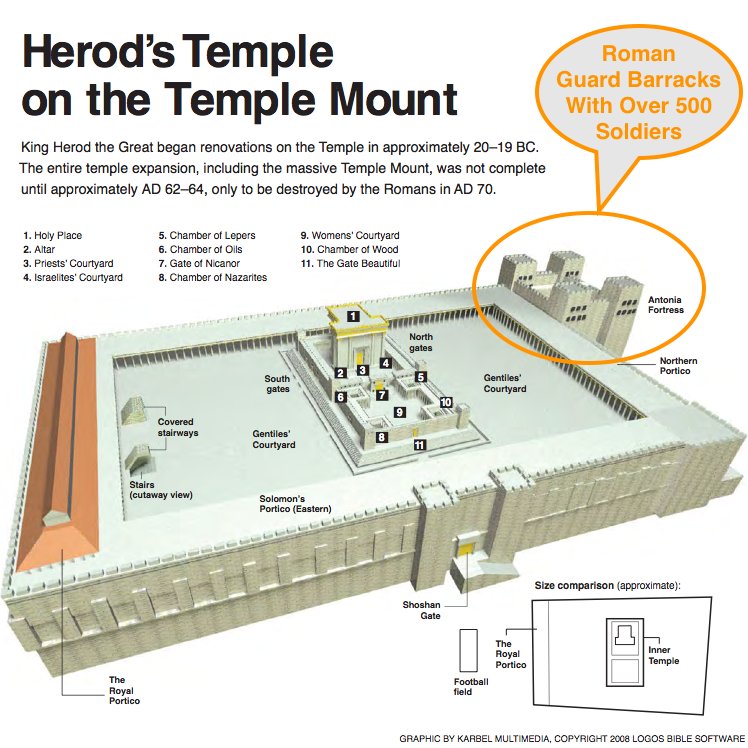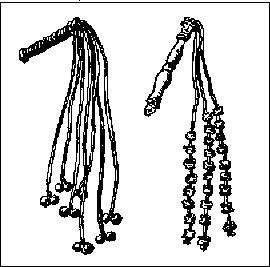Blog Post
Posted by Dion Todd October 7th, 2018 6,040 Views 0 Comments
RHM Bible Study, Acts 22 from Refreshing Hope Ministries on Vimeo.
Today we are going to study Acts chapter 22 in depth. You can follow along in your own Bible if you like. I will be reading from the World English Bible because it is the only modern English translation that is copyright free, and I can read the entire Bible on video without any legal drama or breaking anyone’s rules. After you finish this study, please take the accompanying quiz to test your knowledge. Thanks to everyone that has participated so far. Let’s get started:
First let’s set our location and do a brief catchup. In Acts chapter 21, Paul completed his third missionary journey and made his way to Jerusalem. It had been many years since he had visited there and he wanted to attend the Pentecost feast with the mother church. Many prophets warned Paul along the way that there was trouble waiting on him there, the Lord was preparing him to face what was coming.
Paul met with the church elders in Jerusalem. They told him to put the people at ease, that he should join with some Jewish brothers in the vow of the nazarite, so they would know that he was a believing Jew like them. Paul agreed, but when he went into the temple, some angry Jews stirred up a riot, dragged Paul from the temple, and intended to beat him to death. Roman soldiers stepped in and had to carry Paul back to the barracks in order to protect him.

Acts Chapter 22 beginning in verse 1, reading from the World English Bible: “Brothers and fathers, listen to the defense which I now make to you.” 2 When they heard that he spoke to them in the Hebrew language, they were even more quiet.
Paul was bleeding and torn from a terrible beating by his Jewish kinsmen, who would have killed him. He only escaped death because the Roman soldiers intervened, then he got the commander’s permission to address the people. Paul began to speak to the Jews in Hebrew and make his defense using the same intro that Stephen had before him, “Brothers and fathers, listen”. This audience had just tried to kill him, thinking that Paul had profaned the temple by sneaking a Gentile in past the Court of the Gentiles.
He said, 3 “I am indeed a Jew, born in Tarsus of Cilicia, but brought up in this city at the feet of Gamaliel, instructed according to the strict tradition of the law of our fathers, being zealous for God, even as you all are today.
Paul spoke as a Jew speaking to Jews. He was careful to lay the common ground between them and told them the story of his life, before he met Jesus Christ and his conversion. Luke first told the story of Paul’s conversion in Acts chapter 9. After that, Paul told the story in some way at least four more times in the New Testament: here in Acts 22, Acts 26, Philippians 3, and 1Timothy 1.
Paul told them that though he was born outside of the Promised Land, he was brought up in Jerusalem, and at the feet of Gamaliel, one of the most prestigious rabbis of the day, a Pharisee of Pharisees (Acts 5:34). It’s as if Paul searched for the nicest thing he could say about a mob that had just tried to murder him. “Well, one thing that I can say is that you are zealous toward God.”
4 I persecuted this Way to the death, binding and delivering into prisons both men and women, 5 as also the high priest and all the council of the elders testify, from whom also I received letters to the brothers, and traveled to Damascus to bring them also who were there to Jerusalem in bonds to be punished.
Paul shared with them that they had a lot in common. Though he had been a Christian for more than twenty years now, he had not always been. They had tried to kill him in the name of the Lord, but he was responsible for killing many followers of Jesus before them. For a while, that his job. The great Apostle Paul had once been a bonafide Christian hunter, working directly for the high priest and their council of elders. These people were amateurs compared to him. This had to be surprising news to many in the crowd, but they could easily verify what he was telling them.
6 As I made my journey, and came close to Damascus, about noon, suddenly a great light shone around me from the sky. 7 I fell to the ground, and heard a voice saying to me, ‘Saul, Saul, why are you persecuting me?’ 8 I answered, ‘Who are you, Lord?’ He said to me, ‘I am Jesus of Nazareth, whom you persecute.’
Paul was a fierce persecutor of Christians and Jesus until this intensely bright light from heaven shone around him while on the road to Damascus. It is as if Paul said: “I was just like you until I met Jesus, then my life changed.”
9 “Those who were with me indeed saw the light and were afraid, but they didn’t understand the voice of him who spoke to me. 10 I said, ‘What shall I do, Lord?’ The Lord said to me, ‘Arise, and go into Damascus. There you will be told about all things which are appointed for you to do.’ 11 When I couldn’t see for the glory of that light, being led by the hand of those who were with me, I came into Damascus. 12 One Ananias, a devout man according to the law, well reported of by all the Jews who lived in Damascus, 13 came to me, and standing by me said to me, ‘Brother Saul, receive your sight!’ In that very hour I looked up at him.
Paul makes it clear that there was nothing sinister or covered over about his conversion. He was being a good Jew on his way to arrest some Christians in Damascus when he was struck blind through no fault of his own. A Jew named Ananias was the one that prayed for him, so it was one Jew praying for another one, then he was healed, his blind eyes were opened. It could have happened to any of them.
14 He said, ‘The God of our fathers has appointed you to know his will, and to see the Righteous One, and to hear a voice from his mouth. 15 For you will be a witness for him to all men of what you have seen and heard. 16 Now why do you wait? Arise, be baptized, and wash away your sins, calling on the name of the Lord.’
17 “When I had returned to Jerusalem, and while I prayed in the temple, I fell into a trance, 18 and saw him saying to me, ‘Hurry and get out of Jerusalem quickly, because they will not receive testimony concerning me from you.’ 19 I said, ‘Lord, they themselves know that I imprisoned and beat in every synagogue those who believed in you. 20 When the blood of Stephen, your witness, was shed, I also was standing by, consenting to his death, and guarding the cloaks of those who killed him.’
Paul told them about something that happened about 20 years before, when he had been a follower of Jesus for 2 or 3 years. Even though he had been a Christian for a few years, he still came to Jerusalem to pray in the temple. He wanted the crowd to know that even though he trusted in Jesus, he was not against all Jewish ceremonies and rituals.
Apparently Paul had an impressive vision of Jesus while in the temple then, twenty years ago, but we only see it here and he never referred to this vision in his letters. In that vision, Jesus told Paul to “Make haste and get out of Jerusalem quickly, for they will not receive your testimony concerning Me”. This word from Jesus was probably quite a surprise to Paul. He probably thought of himself as the perfect one to bring the gospel to his fellow Jews. Nevertheless, Jesus gave him this warning and told him to make haste.
Paul wanted to stay and witness to the Jews even if that meant his death, while Jesus wanted Paul to live another 20 years and preach to the Gentiles. Here we see that even for the great Apostle Paul, what we sometimes think is right, and what God wants us to do can be opposite.
21 “He said to me, ‘Depart, for I will send you out far from here to the Gentiles.’” 22 They listened to him until he said that; then they lifted up their voice and said, “Rid the earth of this fellow, for he isn’t fit to live!” 23 As they cried out, threw off their cloaks, and threw dust into the air,
Now we see the real problem, prejudice. The crowd that had just tried to kill Paul, had listened intently to his whole sermon, then erupted into rage over him saying one word. That one word was “Gentiles”, meaning people who were not Jews. This Jewish mob was so outraged at the thought that God’s salvation could be given freely to a believing Gentile that they were ready to kill Paul again. They were tearing off their cloaks and throwing dust into the air in a rage.
The message of Jesus that both Paul and the New Testament preached is this: You may come to God just as you are, whether you are Jew, Gentile, foreigner, high, low, rich, or poor, but you must come to Him through Jesus Christ. Jesus is the way, and what ethnic group or social status you are, does not matter.
In their minds, the Jewish crowd didn’t mind this talk about Jesus, but they could not stand the idea that God might save Jews and Gentiles in the same way. They were incredibly offended at the thought of Gentiles becoming Christians, just as Jews became Christians, because that meant that Jews and Gentiles were equal in the eyes of God, and had to come to God on the same terms. They behaved much like God was their property, and people had to come to God on their terms. They were the guardians of the temple gate. To that I say that we should remember that God is the Boss, not our servant.
24 the commanding officer commanded him to be brought into the barracks, ordering him to be examined by scourging, that he might know for what crime they shouted against him like that.
It must have been a confusing sight for the Roman commander. He watched Paul passionately address this large crowd in a language he didn’t understand, for Paul spoke to them in Hebrew. He saw them listening to him intently, then suddenly they erupted into a dust throwing riot. When the cause was explained to him, he must have thought that it was absurd and offensive: All this rioting sprang from their hatred of Gentiles, people just like the Roman commander himself.
25 When they had tied him up with thongs, Paul asked the centurion who stood by, “Is it lawful for you to scourge a man who is a Roman, and not found guilty?”
Paul had already been beaten by the angry Jews who intended to kill him, now the Romans tied him up and intended to flog him, which also may have killed him. This was not the normal Jewish flogging, which was bad enough, but the dreaded Roman flagellum like Jesus suffered before the crucifixion.

26 When the centurion heard it, he went to the commanding officer and told him, “Watch what you are about to do, for this man is a Roman!” 27 The commanding officer came and asked him, “Tell me, are you a Roman?” He said, “Yes.” 28 The commanding officer answered, “I bought my citizenship for a great price.” Paul said, “But I was born a Roman.”
Paul’s parents (or grandparents) must have been awarded the rights of citizenship for some good done on behalf of Rome. How the citizenship was acquired by Paul’s father or grandfather we have no means of knowing, but it was probably for valuable services rendered to a Roman general or administrator in the southeastern area of Asia Minor where they lived. Because of this, Paul was born a Roman citizen.
Paul was an extremely rare individual. It was uncommon to find such an educated, intelligent, devout Jew who was also a Roman citizen. God would use this unique background to use Paul in a special way, even as he wants to use your unique background to use you in a special way.
The penalty for lying about one’s Roman citizenship was significant, sometimes ending in death. It wasn’t the kind of thing people commonly lied about, so the commander just asked Paul directly and accepted his answer. The commander said that he bought his citizenship at a great price. Now as far as we know, Roman citizenship could not be bought for a fee, only for a bribe to the right official. Normally, only right or reward granted citizenship. The point that the tribune was making was not that he doubted Paul’s claim, but rather he was implying that it must be a lot easier now a days if someone like Paul could become a Roman citizen. “They are letting anyone become a citizen these days…”
29 Immediately those who were about to examine him departed from him, and the commanding officer also was afraid when he realized that he was a Roman, because he had bound him.
Paul had his hands tied with leather straps so his hands joined around a wooden pole and his back was totally exposed. He was ready for a brutal beating, one that would not stop until he confessed to the crimes he was suspected of. It was a serious violation of Roman rights to even bind a Roman citizen without due process, and they had already violated his rights by tying him to the pole. When they heard that he was a Roman citizen, they immediately released him.
30 But on the next day, desiring to know the truth about why he was accused by the Jews, he freed him from the bonds, and commanded the chief priests and all the council to come together, and brought Paul down and set him before them.
They brought Paul before the Jewish Sanhedrin (court) and the chief priests for further interrogation. We will cover that meeting in the next chapter.
From now until the end of the Book of Acts, Paul remains in Roman custody. As far as this book is concerned, this was the end of Paul’s time as a free man, and the end of his mission trips, but not the end of his witness or his usefulness to God and God’s people. In a way, God simply provided him with a lot more time to write.
This concludes today’s chapter of our ongoing Bible Study. Thank you for participating and being a part of Refreshing Hope! To complete this study, we invite you to test your knowledge with the accompanying quiz!

This blog post has an accompanying Bible quiz: Acts Chapter 22

